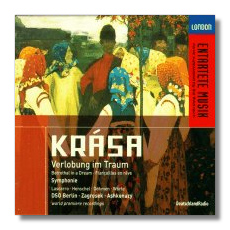
The Internet's Premier Classical Music Source
Related Links
- Latest Reviews
- More Reviews
-
By Composer
-
Collections
DVD & Blu-ray
Books
Concert Reviews
Articles/Interviews
Software
Audio
Search Amazon
Recommended Links
Site News
 CD Review
CD Review
Hans Krása

- Verlobung im Traum *
- Symphonie
* German Symphony Orchestra, Berlin/Lothar Zagrosek
German Symphony Orchestra, Berlin/Vladamir Ashkenazy
London 455587-2
Here is another pleasant surprise from London's Entartete Musik series: an obscure opera by Hans Krása, one of the Jewish composers who perished in the Terezin concentration camp in 1943. Verlobung im Traum (Betrothal in a Dream, 1933) is based on the tragic-comic novella Uncle's Dream by Fyodor Dostoyevsky. The doddering foolish Prince is tricked by social climber Maria Alexandrovna into proposing to her daughter Zina. The Prince is soon just as easily tricked by Paul, Zina's suitor, to believe the betrothal was all a dream.
Musically, the opera is charming and dramatic, as well as poignant without being sentimental. The styles in the opening scenes sound like a deranged marriage between Giacomo Puccini and Arnold Schoenberg, whom Krása worshipped. The abrupt changes from tender tonalism to spitting dissonance is all Krása's though. He plays with contrasts in the natural speech sequences too. In one comic scene the Prince's vocal slurs span the staff as he complains of gout, while Maria lyrically urges him to take a wife. Krása actually improves on Dostoyevsky's text, trimming its fat and introducing key elements earlier. (Dostoyevsky always needed – but never got – a ruthless editor.) And while Dostoyevsky's "sonorous contralto" Zina sing an "old French Romance," Krása's edgy soprano Zina sings Bellini's Casta Diva. He then forges a bracing ensemble of conflicting motives that Verdi (or at least Leoncavallo) would have admired. Arch Weilian saxophones drone as Maria fakes tears at "losing" her daughter to marriage. The revenge duet between Paul and Maria's sister-in-law is a complex tour de force, its stormy passages revealing their congruent nasty intentions. Conductor Lothar Zagrosek seems to have dwelled in Krása's cabarets and absorbed their revue patter songs. His complex tempo shifts and keen dramatic sense lured me into Act II, eager for the next bar. He didn't disappoint. In this resolution, Krása's characters hum, whistle, declaim, and sing their machinations to each other and themselves. The daffy duet between the Prince and Paul mocks the vocal arabesques of Puccini. Later when the Prince relates an erotic dream, his sentimental aria gets deflated by the rapid-fire chatter of the nosy townswomen. Krása's skill at handling ensembles, his peppery dissonance, and his subtle orchestration at the Chekovian climax make this bittersweet work more engaging and memorable than his other vocal works, such as the simplistic children's opera, Brundibar.
The other piece on this CD is the Symphonie (1923), a youthful tone poem with Debussy's and Stravinsky's shadows shimmering against its walls. French critic Roland-Manuel spoke of Krása's "spirit of ironic poetry." The final movement is an atonal aria of Rimbaud's eerie poem "The Lice-Pickers." Musically, it is neither shocking or beautiful, nor does it break any new ground. However, it is an intriguing miniature and a worthy item in any Entartete Musik collection.
Copyright © 1999, Peter Bates



















